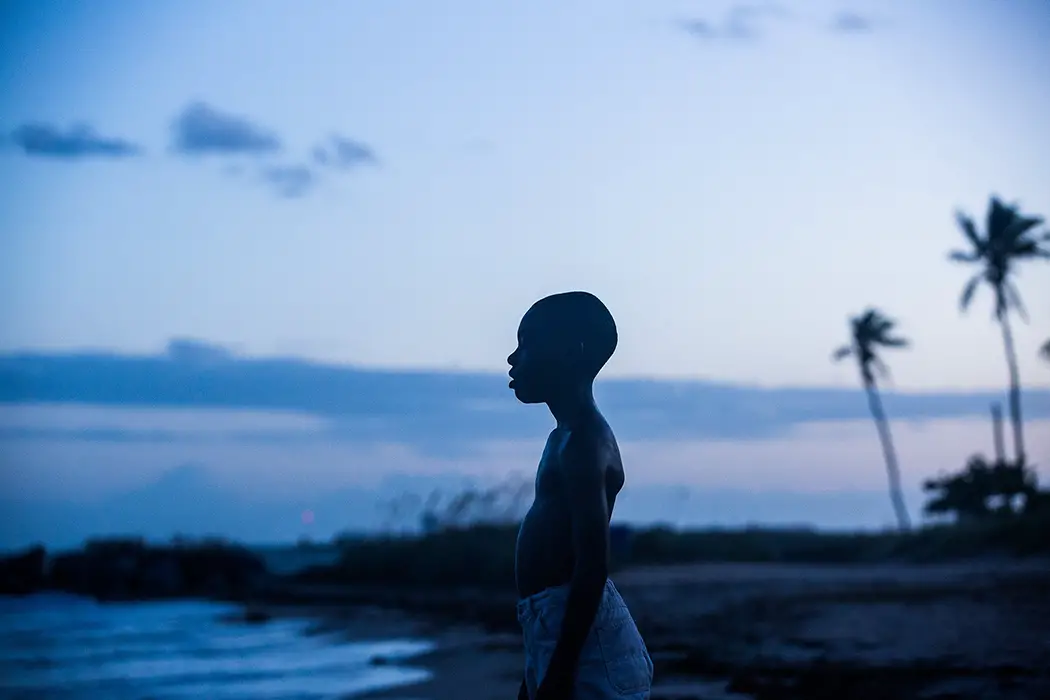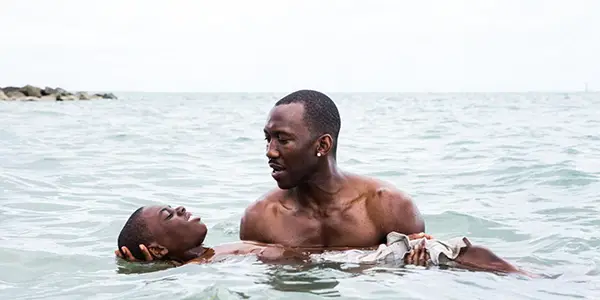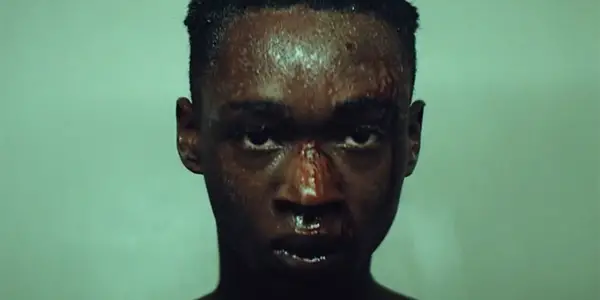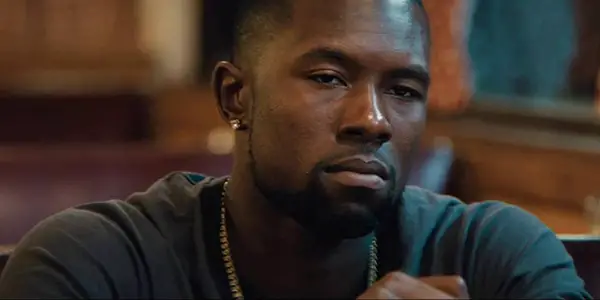MOONLIGHT: A Beautiful & Profound Portrait Of Humanity

David is a film aficionado from Colchester, Connecticut. He enjoys…
Barry Jenkins‘ Moonlight is a moving testament to the power of film. Focused on themes of race, identity, and homosexuality, it is as far removed from my own life experience as could be possible, yet through Jenkins‘ realized eye, the story becomes universally relatable.
Though the film employs a stylistic, arthouse approach as opposed to a traditional narrative, it is nonetheless an important one to watch for people of all walks of life.
Three Acts
The three-act structure is presented in Moonlight as three distinct periods in the life of a boy named Chiron. The first is shown when Chiron (Alex Hibbert) is a young kid growing up in Miami, Florida. He suffers from bullying by other kids, who make fun of his submissive nature, seeming to understand that Chiron is different from everyone else.
During this time, he meets Juan (Mahershala Ali), who he looks up to as a father figure, and Juan’s girlfriend Teresa (Janelle Monae). Chiron’s family life is also far from ideal, with a mother (Naomie Harris) who is neglectful and suffers from drug addiction.

The second act of the film follows Chiron as a teenager (now played by Ashton Sanders). Though still possessing the same passive, meek demeanor, he starts to come more to terms with his homosexuality, including an encounter with a friend that he knew when he was younger named Kevin (Jharrel Jerome). His emerging resistance to being bullied, though, leads to an unexpected and tragic outcome. The third act of the film then deals with the aftermath of this and how it affects Chiron’s life, forwarding ten years into the future when he is in his late 20’s (now played by Trevante Rhodes).
The Three Chirons
According to Jenkins, the three versions of Chiron were chosen not due to their physical resemblance, but solely because of their similar-looking eyes. As the saying goes: “the eyes are the window to the soul.” Though each actor plays the character through their own perspective, they all manage to capture the quiet inner turmoil of Chiron, a person forced to mask their true self under various alter-egos. In a fitting manner, the three versions of the character also have three distinct names: Little in the first section, then Chiron, and finally Black.
Of the three actors, the more mature Trevante Rhodes embodies the qualities of Chiron most succinctly; aptly showing how the character has developed a hardened layer to cover up who he truly is inside. The breaking of this facade is seen once he meets up again with his childhood friend Kevin (now played by André Holland), reverting back to his younger, more subdued self.
Additional standout performances include Naomie Harris as Chiron’s addiction-stricken mother. Despite the character’s often despicable behavior, Harris plays her with a loving and compassionate warmth, showing that the only person that matters in her life is her son. Mahershala Ali, hot off the recent series Luke Cage, here shows a more sensitive side, playing the strong father figure in Chiron’s early life.
Stylistic Tone
Barry Jenkins‘ Moonlight utilizes a stylistic tone, which enables the film to flow with a poetic grace. It may take some getting used to, yet it is equally clear that the style is symbolically significant, an appropriate choice by Jenkins and director of photography James Laxton.
The film is told through the mind-set of a boy that feels alienated from those around him – knowing that he is different yet also realizing that he can’t reveal his true self due to the prejudices of his world. As a result, Jenkins, as opposed to simply allowing the camera to isolate the audience as a passive observer, instead draws us into the mix, forcing us to be an active participant in the entirety of Chiron’s harrowing experiences.
Awkward or distressing situations become even more unnerving to watch as a result. Jenkins utilizes a variety of techniques to show this, from hand-held cameras used during motion-driven scenes, to stark closeups coupled with ambient sounds, to long periods of uncomfortable silences when Chiron interacts with others.

Jenkins’ style in Moonlight is somewhere between an arthouse film and a documentary. At one point, a scene showing groups of kids playfully beating up another youngster is shot through slow motion, with orchestral leaps playing in the background through Nicholas Britell‘s elusive score, as if witnessing something much grander in the play-fighting. Yet in other scenes, the camera is placed in a stationary position, swiveling around to gaze at each character in turn, making it seem as if we are simply observing people in real life.
There are times when Jenkins goes a bit too far with his approach, such as the opening scene of the film, in which the camera spins in dizzying circles around two characters with no apparent reason for doing so. Yet, once you get used to the avant-garde realistic style, the film’s deep-rooted themes become all the more apparent.
Identity Crisis
Moonlight is a film about finding one’s identity in an intolerant world. Chiron is a boy who, while enduring the difficulties of growing up as a minority and in a hostile environment, is also a latent homosexual. Though he attempts to conceal his sexual orientation, it is evident that his overall demeanor induces other boys around him to bullying. This eventually leads to him building an impenetrable wall around himself, creating a persona that is more easily accepted.

Yet, it’s also evident that this alternate, more readily-accepted persona is not only damaging, but also against everything that Chiron has felt for his entire life, especially given his family background. It’s only once he finally confronts his childhood friend Kevin that both past and present finally collide, in one beautiful moment of acceptance. Though the conclusion is ambiguous at best, it is surprisingly hopeful for the future.
We are now living in a world that is more accepting of homosexuality, yet it’s important to note that masculinity is still prized above everything else, especially from the hardened world that Chiron comes from. It’s uncertain where he will go from here, yet to simply reach this peak of understanding is enough, at least for now. Perhaps that is the best takeaway from Moonlight as well – we haven’t yet become as accepting as we could as a society, but we’ve made progress. Where we go from here is solely up to us.
Conclusion
To conclude, Moonlight is a moving, gorgeous portrait of humanity, glimpsing into a very real facet of the world. Though with a simplistic basis of following one man through three distinct periods of his life, the film also manages to be a profoundly realistic look into what it means to be a minority, a latent homosexual, and overall to find one’s identity in a hostile world.
Employing an unconventional editing and shooting style that pulls you right into the film, Barry Jenkins forces you to experience these walks of life, which many people would never know otherwise. The style might be unusual for those who aren’t used to it, and in addition might even be an uncomfortable experience due to the film’s ability to plunge the viewer unrelentingly into the types of situations that Chiron endures.
Yet, from any perspective, Moonlight is a poignant and significant reminder of the power of empathy. It might not completely alter preconceived prejudicial notions, but it could potentially open peoples’ minds, even if just a little bit. And just that small amount of change could make a world of difference.
What do you think of Moonlight? Do you think Barry Jenkins’ approach was effective, or does he go too far with his style?
Moonlight is now playing in limited theaters in the United States and will be released in the UK on 24 February 2017. For all international release dates, click here.
Does content like this matter to you?
Become a Member and support film journalism. Unlock access to all of Film Inquiry`s great articles. Join a community of like-minded readers who are passionate about cinema - get access to our private members Network, give back to independent filmmakers, and more.
David is a film aficionado from Colchester, Connecticut. He enjoys writing, reading, analyzing, and of course, watching movies. His favorite genres are westerns, crime dramas, horror, and sci-fis. He also enjoys binge-watching TV shows on Netflix.













